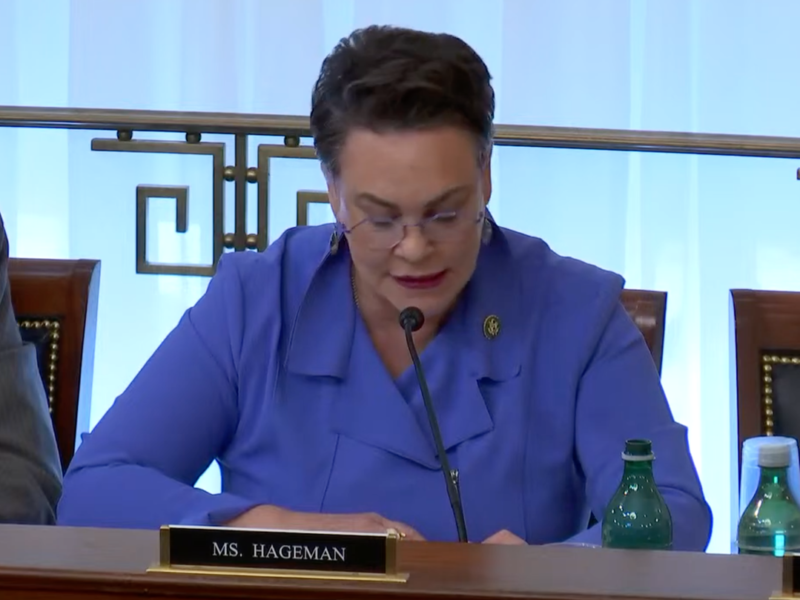Congressional Panels Consider Hageman’s Bills on Grizzly Bears, Tribal Lands
Lawmakers clash over grizzly bears’ endangered species classification, but agree on tribal matters
- Published In: Politics
- Last Updated: Mar 25, 2023

In hearings on Thursday and Friday, a Congressional panel marked up several pieces of legislation from Wyoming Rep. Harriet Hageman touching on local environmental control and tribal matters. (Photo via YouTube / House Committee on Natural Resources)
By Jacob Gardenswartz
Special to the Wyoming Truth
WASHINGTON — Wyoming Rep. Harriet Hageman is one step closer to passing her first individually-sponsored bills since taking office, as lawmakers held hearings this week to markup policies touching on her priorities of local environmental control and tribal sovereignty.
The Water, Wildlife and Fisheries and Indian and Insular Affairs subcommittees of the U.S. House Committee on Natural Resources met on Thursday and Friday respectively to debate the merits of four Hageman-sponsored bills, including House Resolutions 1245, 1419, 1246 and 1532.
The first two bills were by far the most contentious. If passed, they would remove grizzly bear populations in the Yellowstone area and Northern Continental Divide Ecosystem from the federal list of endangered and threatened wildlife, enabling local leaders to exert far greater control over how the bears are treated.
The other bills concerned tribal land sovereignty, expanding upon Hageman’s efforts to promote economic development in Indian country during her first hearing chairing the Indian Affairs subcommittee earlier this month. Lawmakers of both parties expressed support for those policies, though there was some debate over the necessity of one of the provisions.

In debates over each matter, Hageman delivered clear arguments in favor of her proposed interventions and leveraged her experience as a litigator during witness questioning. All four bills still face a long journey to becoming law — including more votes by full committee, full House and U.S. Senate — before they must then gain the approval of President Joe Biden to take effect.
Hageman says government held ‘hostage’ on grizzly bears
H.R.s 1245 and 1419, the latter of which was cosponsored with Rep. Matt Rosedale (R-Mont.), would remove grizzly bear populations in Wyoming and Montana from the list of animals covered by the Endangered Species Act, and further prohibit future legal challenges that might reinstate protections.
Though researchers estimate the population of mainland American grizzlies totaled nearly 50,000 at their peak centuries ago, that number had dwindled to fewer than 1,000 throughout the whole country when the bears were listed as “threatened” under the Endangered Species Act (ESA) in 1975. In doing so, it became unlawful to “kill, capture, harm, harass, import or export” a grizzly bear in any part of the Lower 48, with few exceptions.
In the mid-2000s, as the population of Yellowstone area grizzlies climbed back up to roughly 600, the U.S. Fish and Wildlife Service proposed delisting the bears from the (ESA), formally announcing a plan to do so in 2007. But that plan was quickly put on hold as lawsuits from environmental and tribal groups sought to preserve the bears’ protections.
A decade later, officials in former President Donald Trump’s administration attempted to delist the bears yet again, though that effort was similarly blocked by federal courts amid environmental lawsuits. Today, the grizzly bear population in the Yellowstone area is estimated to be upwards of 1,000, significantly higher than the roughly 300 bears there in 1975 but nowhere close to the size of the original population.
Still, Hageman said Thursday that the bears’ approximately four-fold increase in population size over the past half-century should be celebrated as a “success story.”
“We ought to build on that,” Hageman argued, praising officials’ decision to delist the bears and decrying efforts by “radical environmental groups” and “activist judges” to reinstate protections.
“Environmental litigants have been holding farmers, ranchers and the government hostage to their demands and for the purpose of protecting their own pocketbooks,” Hageman added. “Wyoming is done with waiting on the federal government when the science has said for a long time that it’s time to act.”
Testifying before the committee, Brian Nesvik, director of the Wyoming Wildlife Game and Fish Department, agreed. He argued grizzly bear management should be returned to local states and tribes “by whatever means is necessary.”
But Democrats on the panel, and federal officials testifying before it, pushed back strongly.
“The idea that we, as members of Congress sitting here in Washington, are more qualified than scientists and experts at the top of their field to make delisting decisions for Endangered Species Act and then to lock those in by insulating them from judicial review — that is incredibly extreme,” said Rep. Jared Huffman (D-Calif.), the top Democrat on the subcommittee.
Stephen Guertin, deputy director for policy with the U.S. Fish and Wildlife Service, similarly claimed the bill would amount to “circumventing the scientific processes currently underway.” He argued it’s “not uncommon” for delistings to be challenged in court and noted the existing procedure was the “best path” to handle such matters.
As it stands, Wyoming is currently engaged in efforts to delist the bears through that path, as Gov. Mark Gordon petitioned for the grizzlies’ removal early last year. Though the state’s petition was favorably received, federal officials are now undergoing a “comprehensive status review” — a process which could stretch on for years.
Bills to ease tribal land leasing gain bipartisan traction
In her role as chair of the Indian and Insular Affairs subcommittee, Hageman presided over a hearing about her two tribal lands-related bills on Friday.
H.R. 1246, if passed, would extend the period of time federal lands held in trust could be leased by Native American owners to 99 years, drawing on testimony from tribal leaders earlier this month that existing policies made economic development on such lands extremely difficult.
“Unfortunately, lease authority up to 99 years is often needed for today’s long-term commercial leases,” Hageman said. “And the fact is a 50-year lease term is simply too short.”
Much of the hearing focused on Hageman’s other bill, which would authorize any tribe to sell or transfer certain types of lands “without the consent of the Federal Government.” The bill seeks to rectify the current policy which requires a separate Congressional action for those transactions.
Both proposals enjoyed broad support from Democrats on the panel and tribal leaders in attendance. Rep. Raúl Grijalva (D-Ariz.), the top Democrat on the subcommittee, called the bills a “very important” step to address the “the paternalism of the federal government with regard to tribes” and amplify tribal sovereignty.
While noting his agency supported the first measure, assistant secretary for the Bureau of Indian Affairs Bryan Newland said he opposed the latter and warned of possible “unintended consequences.”
Central to that debate was an issue many tribes face attempting to procure title insurance during property transactions. Native American officials testified that numerous insurance agencies refuse to insure purchases without explicit approval from the Department of the Interior, despite the fact that no such approval is required by law.
Though Newland said he’s sympathetic to the issues tribes are facing, he pointed to uncertainty around “the consequences [of the proposed bill] and how it would interact with two centuries of case law.”
“If we have the opportunity to clarify something that is going to give our tribes the autonomy that they seek, don’t you think that that could be beneficial?” Hageman countered.
Newland noted he did, but was concerned that “if we pull the Jenga block out from the bottom row, we don’t know how that affects everything else.”
Hageman ultimately concluded by receiving a commitment from Newland that he and his department would work with lawmakers to develop a legislative fix to such issues, and by thanking the tribal officials in attendance.
“I hope that you have an opportunity to see some of the beautiful cherry trees, the cherry blossoms out there,” Hageman said. “It was a gorgeous drive coming in this morning.”













